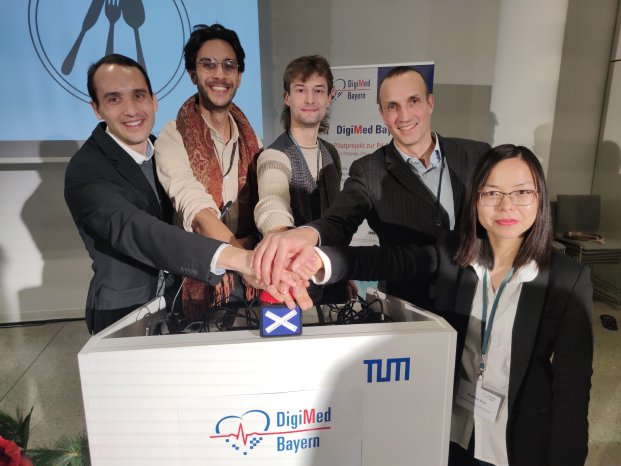The DigiMed Bayern flagship P4 medicine project (www.digimed-bayern.de), the symposium and the DigiMed Bayern Secure Cloud offer valuable and tangible approaches for actively shaping the upcoming European Health Data Space (EHDS), for which the EU legislative process is currently underway. With the EHDS, the EU Commission wants to enable better use of health data for medical care, research and innovation as well as for health policy decisions, and support individuals in taking control of their own health data. In recent years, Germany has worked its way into the European midfield in terms of digitalization in the healthcare sector. Above all, the EHDS offers great opportunities for Germany, although risks must also be highlighted. Germany should therefore take a leading position.
DigiMed Bayern focuses on advancing Germany in the responsible use of health data in scientific, medical and technical aspects. The focus is on how the widespread disease atherosclerosis and its serious consequences, heart attacks and strokes, can be prevented. To achieve this, it is initially necessary to integrate a large amount of high-quality health data. A team of experts from various disciplines analyzes this data to identify patterns that may be important in the development or progression of the disease.
Publicly funded institutions such as universities, hospitals and research institutes generate large and important volumes of data. However, important secure and cost-efficient cloud infrastructures are lacking for the use of this data. The DigiMed Bayern Secure Cloud, which was launched at the DigiMed Bayern Symposium, will not only serve DigiMed Bayern scientists from ten research institutes as a research pilot project, but will also provide and develop expertise in the field of secure cloud infrastructures "Made in Germany". This is a prerequisite for shaping the EHDS in a leading way and using it early on for the common good.
Prof. Dr. Heribert Schunkert, Scientific Director of DigiMed Bayern and Director of the Clinic for Cardiovascular Diseases at the German Heart Centre Munich, says: "In order to be able to treat diseases in a targeted manner, we need to understand the correlations in their emergence. This requires data. Integrating and analyzing this data can therefore save lives. At DigiMed Bayern, we have already achieved a lot for and with patients, for example with the Vroni study, the calculator for the risk of heart disease and the HerzFit app. Integrated data helps to map the development of disease at a molecular level. However, the spectrum of analyses extends to the macroscopic level, where the aim is to achieve improvements in the healthcare system. The availability and analysis of large and in-depth data sets from many patients will thus be able to contribute to better health at lower costs in the future. In our work, we have found that the vast majority of patients understand and support these connections."
Dr. Jens Wiehler, Managing Director of DigiMed Bayern and Digital Health Lead at BioM Biotech Cluster Development GmbH, adds: "The availability of health data and the ability to process it securely, efficiently and scalable with interdisciplinary teams of experts are a bottleneck for medical research and development. In addition to the medical-scientific successes, DigiMed Bayern is also helping to eliminate the bottleneck by developing a secure cloud environment in a public data centre. Ultimately, however, this challenge will only be solved through close cooperation with industry. This will help to improve our healthcare system and will also benefit Germany as a research and business location."
About DigiMed Bayern
The DigiMed Bayern flagship project started at the end of 2018 with approximately 22 million euros in funding from the Bavarian State Ministry of Health and Care (StMGP) as part of the BAYERN DIGITAL II master plan. The project goal is to integrate P4 medicine (predictive, preventive, personalised, participatory) in the specific indication of atherosclerosis into everyday clinical practice. The ultimate aim is to improve the prediction of disease risks, targeted prevention as well as diagnosis and therapy. To this end, extensive health data of patients with atherosclerosis are collected and analysed. The scientific director of DigiMed Bavaria is Prof. Heribert Schunkert from the German Heart Centre Munich. BioM Biotech Cluster Development GmbH is responsible for the project management and coordination. World-leading consortium partners from Bavaria such as hospitals, patient organisations and research institutions are involved in the project.
More information at: www.digimed-bayern.de.
About the German Heart Centre Munich
The German Heart Centre Munich of the Free State of Bavaria - clinic at the Technical University of Munich - is an internationally renowned maximum care clinic that offers specialist medicine at the highest level and treats heart patients of all ages according to the latest medical knowledge. The hospital's own practice-orientated research contributes to the further development of diagnostic and treatment concepts. The guiding principle of the hospital is to bring together the various specialities under one roof in order to provide optimal care for patients with cardiovascular diseases in constant close interdisciplinary cooperation.
About the LRZ
The Leibniz Supercomputing Centre of the Bavarian Academy of Sciences and Humanities has been the competent IT partner of Munich's universities and colleges as well as scientific institutions in Bavaria, Germany and Europe for over 60 years. It provides the full range of IT services and technology as well as consulting and support - from e-mail and web servers to internet access, virtual machines, cloud solutions and the Munich Scientific Network (MWN). With the supercomputer SuperMUC-NG, the LRZ is one of the leading international supercomputing centres and focuses in the field of future computing on emerging technologies, artificial intelligence, machine learning and quantum computing.

